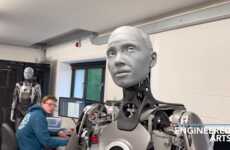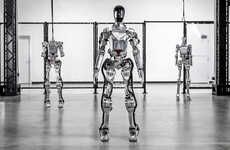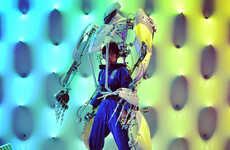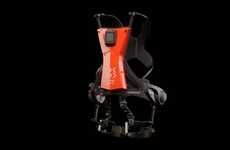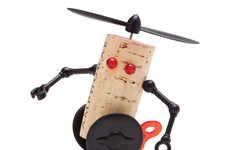
Humanoid Cyborgs Can Now Have Skeletal Structures and Muscles
Elise Ying-Hei Ho — December 17, 2012 — Tech
References: youtu.be & geekologie
Robots in real life are quickly catching up to the fantasies reflected on the big screen like Kenshiro, which is a prototype for humanoid cyborgs that have skeletons and muscles like a human being.
Created by the University of Tokyo, the Kenshiro is meant to emulate the body and functions of a 12-year-old boy. Designed with artificial bone structure made of aluminum and lab-produced muscle imitators, the humanoid cyborgs are able to mimic various humanistic actions such as rotating shoulders, bending knees and elbows, jumping jacks and stretches, leaning forwards and backwards as well as many other motions that consist of muscle contraction and expansion.
Despite the life-like capabilities of this machine, researchers have yet to achieve humanistic speed and precision with Kenshiro, though they have definitely have come a far way.
Created by the University of Tokyo, the Kenshiro is meant to emulate the body and functions of a 12-year-old boy. Designed with artificial bone structure made of aluminum and lab-produced muscle imitators, the humanoid cyborgs are able to mimic various humanistic actions such as rotating shoulders, bending knees and elbows, jumping jacks and stretches, leaning forwards and backwards as well as many other motions that consist of muscle contraction and expansion.
Despite the life-like capabilities of this machine, researchers have yet to achieve humanistic speed and precision with Kenshiro, though they have definitely have come a far way.
Trend Themes
1. Humanoid Cyborgs - Opportunity for disruptive innovation: Develop advanced humanoid cyborgs with improved speed and precision to perform complex humanistic actions.
2. Artificial Skeletal Structures - Opportunity for disruptive innovation: Create artificial skeletal structures using lightweight and durable materials for enhanced humanoid robot design.
3. Lab-produced Muscle Imitators - Opportunity for disruptive innovation: Improve lab-produced muscle imitators to enable advanced robotic motions and mimic human muscle contraction and expansion more accurately.
Industry Implications
1. Robotics - Opportunity for disruptive innovation: Explore new applications in humanoid robotics, ranging from healthcare and entertainment to industrial automation.
2. Materials Science - Opportunity for disruptive innovation: Research and develop innovative lightweight and durable materials suitable for artificial skeletal structures in various industries.
3. Bioengineering - Opportunity for disruptive innovation: Advance bioengineering techniques to create more efficient and realistic lab-produced muscle imitators for use in medical and robotic applications.
2.2
Score
Popularity
Activity
Freshness





